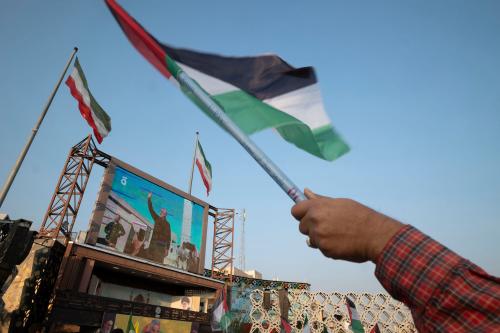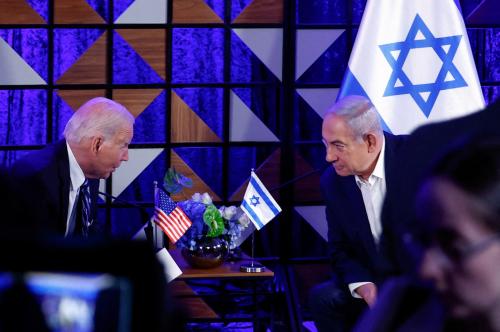In recent weeks, the issue of the Guantánamo Bay prisoner facility has received considerable scrutiny, with a number of notable American politicians suggesting it might be time to shut it down. Given the perception that we have abused Muslim prisoners there—a perception that is causing us much harm in the war on terror, since it fuels anger against the United States and thus helps Osama bin Laden recruit new terrorists—some say it is time to make a completely fresh start.
A couple weeks ago, when asked about the issue, President Bush even seemed open to the idea of closure. All of this debate occurred shortly after Amnesty International called Gitmo as well as other U.S. detention facilities in the war on terror the “gulag” of our times.
Perhaps Gitmo should be closed. But that seems unlikely to happen. Vice President Dick Cheney has recently weighed in strongly against the idea, and in fact the Bush administration has just announced plans to expand the facility.
Moreover, this issue should not be viewed as the central question in shaping the perception of the United States around the world and among Muslims in particular. Mistakes have surely been made in how we hold and treat Islamic prisoners—denying them, for a time, any right to Geneva Convention standards of treatment, and suggesting that the writ of habeus corpus did not apply to Muslim prisoners because Gitmo is not on American territory (a silly argument that the courts have since rejected).
In addition, several specific cases of serious abuse have been documented, and senior leaders in the U.S. military, while probably not criminally complicit, did not do enough to prevent them. But the United States runs no gulag. The issue of detentions, while important, is not the centerpiece of the struggle for hearts and minds.
Some improvements are indeed needed at Gitmo, to be sure. While most abuses appear to have been in the early years of the war on terror and the early months of the Iraq operation, we need expedited procedures to review the cases of detainees so that those imprisoned wrongly will be freed as quickly and reliably as possible. Much of this will have to happen at the classified level, within the Department of Defense’s jurisdiction. And given the nature of the conflict, in some cases we will have to hold people on strong suspicion of their guilt even when we cannot prove it.
But all the more reason that the Pentagon needs to ensure that an independent review process, with full power to release those deemed innocent, is established. So far, while progress has been made and many innocents (as well as a few guilty) prisoners released, the review process is not seen as independent or timely or wholly fair.
But there is a larger concern here—how to address Muslim hatred of the United States. This is the core issue. And the Gitmo debate is only one aspect of it. We need to confront this larger matter head on.
Islamic anger against the United States remains intense and widespread. There are now only a few countries with large Islamic populations with which the United States still enjoys solid and good relations—Turkey, India, some Mideast countries such as Jordan and Egypt. Throughout the Arab world, publics are deeply anti-American. The poll numbers are abysmal, with those saying that they hold favorable views of the United States generally less than 10 percent of the population throughout the Arab world.
Largely for these reasons, while al-Qaeda may not have the capacity for centrally organized, spectacular attacks that it conducted up through 9/11, jihadist groups around the world have not diminished in size one iota, and the frequency and lethality of terrorist strikes remain at very high levels.
Defeating jihadism must become one of the two or three central pillars of American foreign policy, analogous to containment doctrine in the Cold War. Just as containment had a military element, but also powerful diplomatic and economic pillars, so we need to get beyond thinking of the war on terror in principally military and intelligence terms. These elements of hard power are essential, to be sure, but they are far from adequate.
Some efforts are being made to address what might be termed the “why do they hate us?” question. But beyond the broad vision Bush articulated in his second inaugural address, with its appropriate emphasis on freedom and democracy, they are piecemeal and inadequate to date.
Big initiatives are also needed in the educational and economic realms. These types of efforts were key in the Marshall Plan; they were key in the development of the East Asian tigers; they were central to the rhetoric and visions of presidents from Truman to Kennedy to Reagan. They involve core strengths of the United States as a country and hence of its foreign policy instruments. They should be central to our long-term strategy to win the struggle against terror. At present they are not.
Major support for educational reform in the Islamic world is required wherever countries are prepared to put aid resources to good use in creating schools—public or private—with more nuanced curricula and less of a role for firebrand clerics. Pakistan, Yemen, Indonesia and other poorer Islamic countries could benefit greatly from more aid for such efforts. Despite the Bush rhetoric, recent reports are that Pakistan has made little to no progress in regulating or reforming its madrassas, underscoring the problem.
In the economics realm, free trade accords are needed with larger Islamic countries as well as the small ones that such efforts have focused on to date. The goal should be not just to pump up selected countries’ gross domestic products but to broaden employment opportunities. Angry, unemployed, bored and hopeless young men are among our greatest worry in addressing the chasm between the West and Islam. The Lieberman-Hagel Middle East Development Plan, envisioning $200 million a year for a regional development bank and related purposes, was a good idea when introduced in 2004 and should be revived.
This is just a beginning of what is needed. For example, no strategy for winning the war against Islamic terrorism would be complete without a strategy for the Israel-Palestine problem. But until we begin to broaden our thinking about the “why do they hate us” and “why is bin Laden so popular” questions, debates solely over questions like whether Guantánamo should survive can distract us from other critical aspects of the real challenges of the day.



Commentary
Op-edThe Wrong Symbol: Mistakes at Guantanamo Fuel Muslims’ Hatred for the U.S.
June 26, 2005